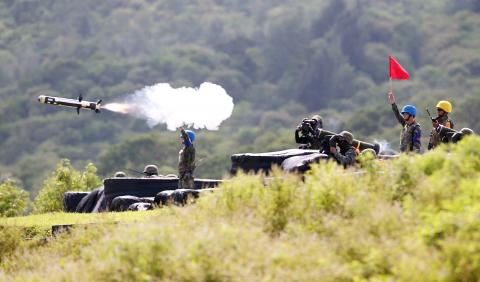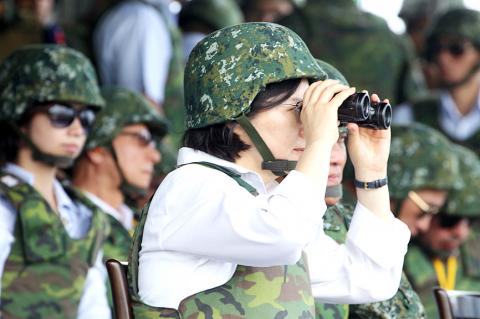President Tsai Ing-wei (蔡英文), in her role as commander-in-chief, presided over the Han Kuang live-fire drills for the first time after assuming office in May.
Tsai praised troops after watching displays of combat readiness in simulated battle exercises at the Renshou military base in Pingtung County.
The 8th Army Corps, in charge of the defense of southern Taiwan, hosted yesterday’s main activities at its Joint Operations Training Base in Hengchun Township (恆春), with wargames involving troops mobilizing in response to a simulated invasion by the Chinese People’s Liberation Army.

Photo: CNA
Tsai watched the drills, applauding a successful execution of the “integrated air-land battle drill,” which saw almost all of the missiles and artillery fire hitting target zones.
After the exercises, Tsai inspected some of the units and delivered an address, saying that upgrading individual soldiers’ equipment is a priority this year and the process has to be accelerated.
“The military will improve if it faces its problems head-on,” Tsai said. “Reform will be achieved if everyone works together, despite the challenges.”

Photo: CNA
“Safeguarding Taiwan and its people is the responsibility of the military,” she said. “We should all work together on that mission.”
“The challenges Taiwan’s defense forces face stem from structural restrictions both outside and inside the military,” she said, adding that the nation must adopt a new military strategy aimed at charting a fresh direction and changing the culture of the armed forces.
Tsai expressed her condolences to the families of four soldiers and officers of the 564th Armored Brigade who died last week after a tank overturned on a bridge and fell into a river while on its way back to the Joint Operations Training Base after a drill.
She promised that the four would be promoted posthumously.
Yesterday’s field exercises were led by the 564th Armored Brigade of the 8th Army Corps, which conducted the joint command operation with the brigade’s mechanized infantry and its tank force, Major General Yang Wei-wu (楊威武) said.
Those units were joined by CM33 Clouded Leopard armored vehicles, CM22 armored personnel and mortar carriers, CM11 main battle tanks and M109A2 self-propelled howitzers, said Yang, who is chief of the 8th Army Corps’ political warfare office.
The units were supported by the 43rd Artillery Command, the Aviation 602nd Brigade and one armored cavalry company, along with a deployment of the Point Defense Array Radar System.
Republic of China (ROC) Air Force F-16 jets provided air cover, along with support from AH-64E Apache helicopters, AH-1W Super Cobra helicopters and one UH-60M Blackhawk helicopter, which can transport vehicles and troops.
It was the first time the Apaches had taken part in Han Kuang exercises after being acquired from the US in a US$1.95 billion deal to procure 30 of the aircraft, with the final batch delivered in October 2014.
The exercises mobilized 143 different weapons systems in 21 categories and saw 7,893 rounds fired from tanks, mortars, flares, missile systems, machine guns, sniper rifles, APILAS — Armor-Piercing Infantry Light Arm System — and a portable, one-shot, 112mm recoilless anti-tank weapon, Yang said.
The ROC Navy was also involved, with a Chi Yang-class frigate from the 168th Fleet striking its target zone from offshore.
In related news, authorities questioned a 42-year-old man surnamed Chang (張), who was arrested for allegedly flying a drone from a residential building near the training base upon Tsai’s arrival.
As of press time last night, authorities were still reviewing photographs taken from the drone and verifying the man’s identity to determine whether he might have intended to gather restricted military information on behalf of foreign nations, including the operations of advanced weapons systems.

A Ministry of Foreign Affairs official yesterday said that a delegation that visited China for an APEC meeting did not receive any kind of treatment that downgraded Taiwan’s sovereignty. Department of International Organizations Director-General Jonathan Sun (孫儉元) said that he and a group of ministry officials visited Shenzhen, China, to attend the APEC Informal Senior Officials’ Meeting last month. The trip went “smoothly and safely” for all Taiwanese delegates, as the Chinese side arranged the trip in accordance with long-standing practices, Sun said at the ministry’s weekly briefing. The Taiwanese group did not encounter any political suppression, he said. Sun made the remarks when

The Taiwanese passport ranked 33rd in a global listing of passports by convenience this month, rising three places from last month’s ranking, but matching its position in January last year. The Henley Passport Index, an international ranking of passports by the number of designations its holder can travel to without a visa, showed that the Taiwan passport enables holders to travel to 139 countries and territories without a visa. Singapore’s passport was ranked the most powerful with visa-free access to 192 destinations out of 227, according to the index published on Tuesday by UK-based migration investment consultancy firm Henley and Partners. Japan’s and

BROAD AGREEMENT: The two are nearing a trade deal to reduce Taiwan’s tariff to 15% and a commitment for TSMC to build five more fabs, a ‘New York Times’ report said Taiwan and the US have reached a broad consensus on a trade deal, the Executive Yuan’s Office of Trade Negotiations said yesterday, after a report said that Washington is set to reduce Taiwan’s tariff rate to 15 percent. The New York Times on Monday reported that the two nations are nearing a trade deal to reduce Taiwan’s tariff rate to 15 percent and commit Taiwan Semiconductor Manufacturing Co (TSMC, 台積電) to building at least five more facilities in the US. “The agreement, which has been under negotiation for months, is being legally scrubbed and could be announced this month,” the paper said,

Japan and the Philippines yesterday signed a defense pact that would allow the tax-free provision of ammunition, fuel, food and other necessities when their forces stage joint training to boost deterrence against China’s growing aggression in the region and to bolster their preparation for natural disasters. Japan has faced increasing political, trade and security tensions with China, which was angered by Japanese Prime Minister Sanae Takaichi’s remark that a Chinese attack on Taiwan would be a survival-threatening situation for Japan, triggering a military response. Japan and the Philippines have also had separate territorial conflicts with Beijing in the East and South China